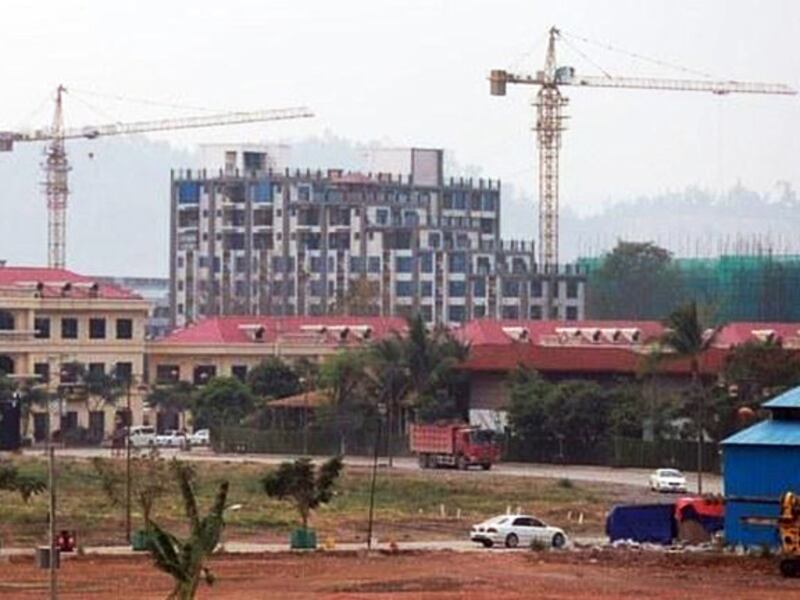Read RFA coverage of this topic in Burmese.
Chinese-run online scam gangs, faced with a expanding crackdown on their operations, are relocating to a township in Myanmar’s Kayin state where junta administration has broken down to capitalize on an absence of rule of law, according to residents and rebel groups.
The shift highlights the difficulties authorities in Myanmar face in rooting out the gangs, which represent just a drop in the bucket of the vast networks of human trafficking that claim over 150,000 victims a year in Southeast Asia.
Residents told RFA Burmese that Chinese gangs based in Shan and Kayin states, as well as the Golden Triangle in northern Laos, are increasingly moving to Kayin’s Payathonzu township, near Mon state’s border with Thailand, where the junta has been inactive for nearly two years.
A senior official of an anti-junta armed group operating on the Thai-Myanmar border told RFA that while they are aware of the influx of Chinese scammers, they are not in a position to effectively address the issue at present.
“[Rebel] forces are funding themselves and purchasing weapons for the resistance,” said the official who, like others interviewed for this report, spoke on condition of anonymity due to security concerns. “While we are aware of the rise of scammers in this area, it is beyond our capacity to address it by force.”
Junta administration was effectively ended in Payathonzu in January 2023, the official said, adding that junta forces in the area rarely leave their barracks, and the regime’s civil service personnel are nowhere to be found.
A handful of rebel groups — including the Karen National Union, the Border Guard Force, the Democratic Karen Benevolent Army and the New Mon State Party — are currently working together in administrating the area, residents said.
RELATED STORIES
Myanmar arrests 45 alleged scam operators in Shan state, but gangs persist
Myanmar junta charges hundreds for scamming on Chinese border
Myanmar junta raids Shan state online scam center, detains hundreds
Scam centers have plagued the border areas of Thailand, Myanmar and China as nationals from all three countries are tricked into -– and subsequently enslaved in –- online fraud.
The businesses typically force trafficked workers to call people across Asia and convince them to deposit money in fake or fraudulent investments.
Tens of thousands involved in the criminal schemes were deported from Myanmar in 2023 by both junta and rebel army officials. Many are linked to forced labor, human trafficking and money laundering, which proliferated after COVID-19 shut down casinos across Southeast Asia.
Ordered out
Earlier this year, the ethnic Karen Border Guard Force based in Kayin’s Myawaddy township ordered scam gangs to clear out of an area known as Shwe Koke Ko New Town within the six months from May 1 to Oct. 31.
Residents estimated that around 600 Chinese nationals who were running the gangs in Shwe Koke Ko New Town and their Burmese employees have since moved to Payathonzu.
The cost of renting a studio apartment in Payathonzu has increased five-fold due to the influx, they said.
“On the town’s main streets, many Chinese nationals are paying higher rents that locals cannot afford,” said one resident, who also declined to be named.
He said that the newcomers are opening restaurants, beauty salons and online gambling sites.

“The Chinese nationals who arrive in the town buy land or property at higher prices if they find it desirable,” he said. “They settle there and start businesses, ranging from food production to gambling.”
Attempts by RFA to reach a Karen National Union official for comment on the situation in Payathonzu went unanswered Friday.
Gangs on the Thaungyin River
Meanwhile, a Burmese former gang employee told RFA that some scammers continue to operate in Shwe Koke Ko, despite the Karen Border Guard Force’s order to leave.
“They operate along the Thaungyin (Moei) River and near the border in the Golden Triangle area,” he said. “If they attract too much attention, they relocate to other areas.”
While Thai authorities are also cracking down on scam gangs along the Thaungyin River, the gangs remain firmly entrenched on the Myanmar side of the waterway, said Karen political commentator Saw Ba Oo Lay.
“They are taking advantage of the absence of a properly established local administration and the lack of rule of law,” he said.
Residents of Payathonzu said they are also concerned about what they called a “surge in human trafficking and crime” in the township.
According to a report by the Washington-based United States Institute of Peace, scam gangs located along the western bank of the Thaungyin River are forcing trafficking victims from more than 50 Southeast Asian countries to work in their operations.
Translated by Aung Naing. Edited by Joshua Lipes and Malcolm Foster.
